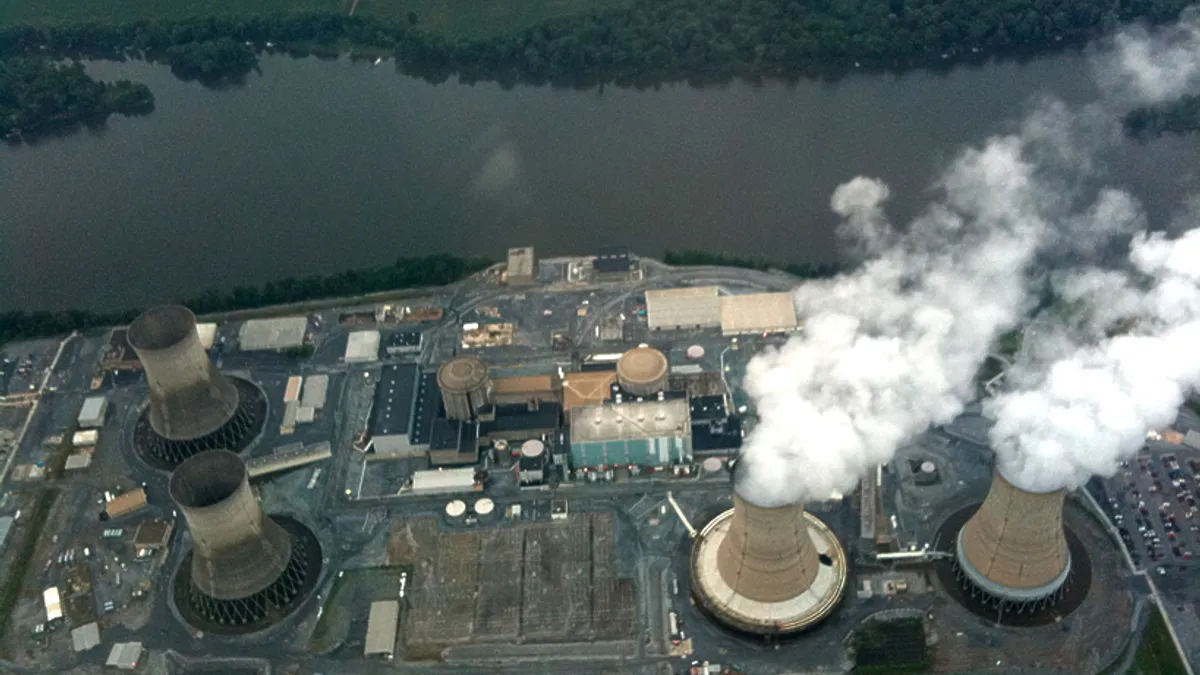Dive Brief:
- The Federal Energy Regulatory Commission’s Friday rejection of an interconnection service agreement between Amazon Web Services and Talen Energy on a two-to-one vote “is not the final word on [data center] colocation” at existing nuclear power plants, Constellation Energy CEO Joe Dominguez said Monday on the company’s third-quarter earnings call.
- Shares of Talen, Constellation and other independent power producers fell sharply Monday on the news, which came as a surprise to many industry observers. Constellation’s stock recovered some ground in Tuesday trading.
- “We know that colocation in competitive markets remains one of the best ways for the U.S. to quickly build large data centers that are necessary to lead on AI,” Dominguez said on the call. “I think it's a narrow ruling by three commissioners; I'm not even sure [it’s] the ruling we would have seen if [Commissioners Rosner and Chang] didn’t recuse themselves.”
Dive Insight:
Despite the regulatory setback, Constellation’s Q3 2024 earnings report, investor presentation and investor call painted a largely optimistic picture of current and future demand for electricity generated by its nuclear, gas and renewable power fleets.
Constellation Energy could add as much as 2 GW of new generation capacity to its nuclear fleet “within the next handful of years” through power uprates at existing plants and the planned restart of its Three Mile Island Unit 1 reactor, Dominguez said.
The company said in September that it aimed to bring the Pennsylvania plant back online in 2028 as part of a 20-year power purchase agreement with Microsoft. But ongoing efforts by the PJM Interconnection to streamline its process for bringing new generation online could instead enable the renamed Crane Clean Energy Center to restart in 2027, Dominguez said.
“We’re working hard to bring Crane on in 2027,” he said.
Customer appetite for additional generation capacity has increased markedly since the TMI-1 restart announcement, and Constellation plans to begin its first two planned power uprates in 2026 at the Byron and Braidwood nuclear power plants in Illinois, Dominguez said.
“I have fewer uprate [opportunities] than customers to sell them to,” Dominguez said.
Constellation is also a partner in NET Power, alongside 8 Rivers, Occidental Petroleum and McDermott. NET Power aims to commercialize a power plant that produces electricity from natural gas while capturing more than 97% of its carbon dioxide emissions.
“Natural gas is a big part of our bridging strategy … provided we have a real pathway to sustainability,” Dominguez said on the earnings call.
Constellation’s Q3 earnings show a core nuclear business that is outperforming the company’s plan thanks to shorter-than-average refueling outages, optimization of both generation and load, and ongoing tailwinds from the production tax credit authorized by the Inflation Reduction Act. The outperformance justified a raise in full-year earnings guidance from $7.60 to $8.40 per share to $8.00 to $8.40 per share, the earnings report said.
Dominguez characterized FERC’s rejection of the Talen-AWS ISA as a “narrow thing” but acknowledged the broader proceeding raised issues for which there was “not a quick fix.” Constellation is mulling how best to “deal with the comments that came out of [FERC’s Friday technical conference on the ISA question] and craft something globally that addresses those comments,” he said.
In the meantime, the company is pursuing opportunities to serve data center customers through both colocation arrangements and front-of-the-meter power sales, he said.
“We’ve … demonstrated through Crane our ability to use our power stations to support data center development anywhere,” he said.














